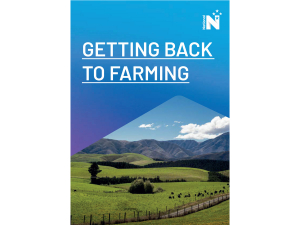Cutting red tape, diluting Wellington's grip on rural sector reforms, reducing the number of regulations, allowing more overseas workers into New Zealand and restoring the option of live animal exports.
These are just some of the key points in National's just released agriculture policy 'Getting back to Farming'. The seven-page document released by party leader Christopher Luxon, agriculture spokesperson Todd McClay and environment spokesman Scott Simpson brings together several issues that National has been talking about for some time - and there are a few surprises.
Luxon takes a swipe at Labour, saying they have used regulations to wage war on farmers and says his party will end that war by 'cutting red tape' which he syas has buried farmers. He says farming is the backbone of the economy and last year agriculture exports totalled $41 billion or 63% of our goods exports.
"Since it was elected, Labour has introduced or changed more than 20 laws and regulations for farmers, adding extra costs on them, often without any environmental gain. For example, wetlands are so poorly defined that farmers are having to go to court to determine whether land is a paddock that can be farmed, or a protected wetland that can't. National's Getting back to Farming package will make regulation fit for purpose," he says.
'Get farming out of Wellington' is one of the many catch cries in the policy document clearly aimed at the increased size of the bureaucracy, especially in departments such as the Ministry for the Environment, which has ballooned to meet the demands of its political masters. There has long been concern that the regulations introduced are impractical to implement on farm and that Wellington is out of touch with rural NZ.
"I want world-class regulation for our world-class farmers. Regulation has a role to play, but rules should avoid prescription, target outcomes, minimise compliance, and be clear to provide certainty," says Luxon.
What could be described as a gimmick is a plan to introduce a 2-for-1 rule - meaning for every new agriculture regulation, two must be removed. The aim, according to Simpson, is to have targeted rules with clear environmental limits so that farmers can work with confidence.
Other policies likely to resonate with rural communities include:
- Making stock exclusion rules more practical to protect critical source areas while avoiding unintended consequences.
- Deferring central government rules requiring resource consents for winter grazing until freshwater farm plans are in place.
- Replacing the winter grazing low slope map and low slope rules for stock exclusion with more effective catchment-level rules to accommodate regional differences.
- Restarting the live exports of cattle with gold standard rules set in regulation to protect animal welfare and safety.
Neither Three Nor Ten
National says it will also repeal Labour's rebranded Three Waters and replace it with Local Water Done Well, a plan designed to restore council ownership and control of water assets while ensuring water services are financially sustainable.
National is also pledging to make appointments to reference and advisory groups based on skills and experience not politics. It says it will also require local and central government to assess the costs of all new rules on the rural sector and publish the findings.
It also plans to establish a permanent Rural Regulation Review Panel to consider every local and central government regulation affecting farmers and advise the central Government on solutions and introduce a no duplication rule.
There are also some carrots for the horticulture sector with National planning to double the RSE worker cap over five years to 38,000 per year and explore other countries entering the RSE scheme. It says it will also change Accredited Employer Work Visas for agriculture to create a path to residency and eliminate the median wage requirement.











